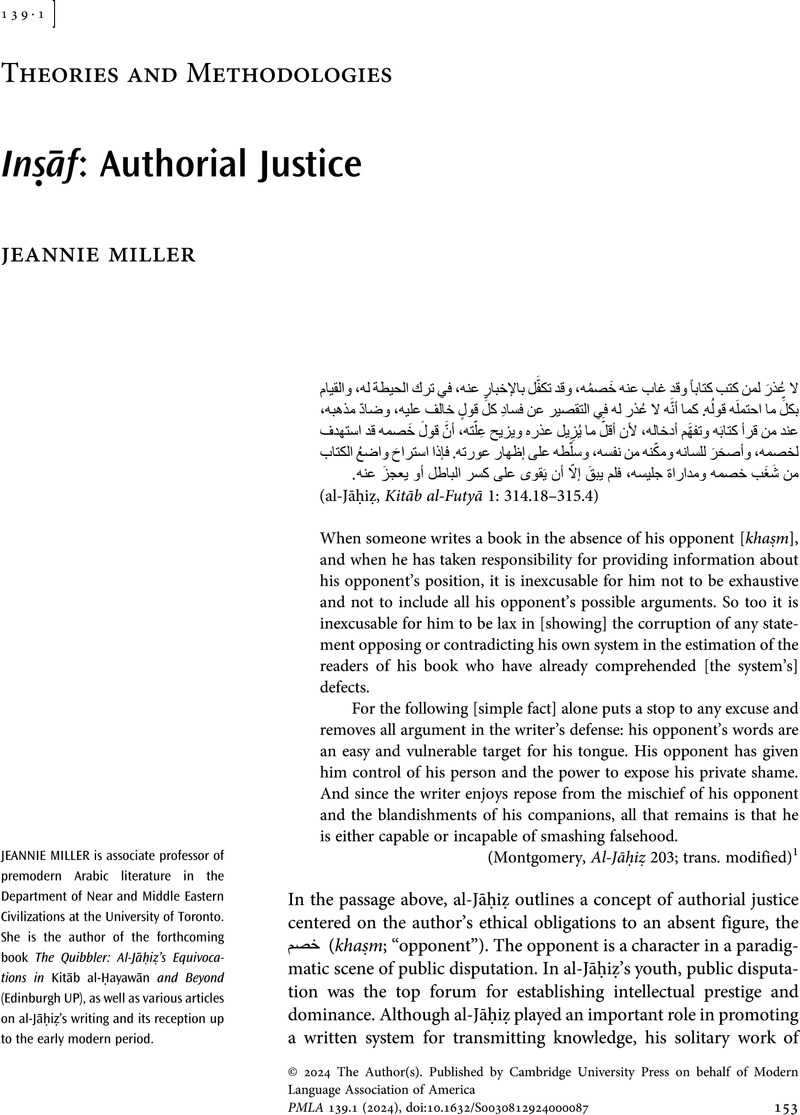No CrossRef data available.
Article contents
Inṣāf: Authorial Justice
Published online by Cambridge University Press: 17 April 2024
Abstract
An abstract is not available for this content so a preview has been provided. Please use the Get access link above for information on how to access this content.

- Type
- Theories and Methodologies
- Information
- Copyright
- Copyright © 2024 The Author(s). Published by Cambridge University Press on behalf of Modern Language Association of America
References
Works Cited
Aṣmaʿī, al-. الأصمعيات [al-Aṣmaʿiyyāt]. Edited by Shākir, Aḥmad Muḥammad and Hārūn, ʿAbd al-Salām, 5th ed., Dār al-Maʿārif Miṣr Taṣwīr Beirut, 2009.Google Scholar
Beeby, Laura. “Epistemic Justice: Three Models of Virtue.” Battaly, pp. 232–43.CrossRefGoogle Scholar
Bernand, Marie. “La critique de la notion de nature (Ṭabʿ) par le Kalām.” Studia Islamica, vol. 51, 1980, pp. 59–105.CrossRefGoogle Scholar
Bernand, Marie. “La notion de ʿilm chez les premiers Muʿtazilites.” Studia Islamica, vol. 36, 1972, pp. 23–45.CrossRefGoogle Scholar
Bernand, Marie. “La notion de ʿilm chez les premiers Muʿtazilites (suite).” Studia Islamica, vol. 37, 1973, pp. 27–56.CrossRefGoogle Scholar
Bernand, Marie. “Le savoir entre la volonté et la spontanéité selon an-Naẓẓām et al-Ǧāḥiẓ.” Studia Islamica, vol. 39, 1974, pp. 25–57.CrossRefGoogle Scholar
Būmalḥam, ʿAlī. المناحي الفلسفية عند الجاحظ [al-Manāḥī al-Falsafiyyah ʿinda al-Jāḥiẓ]. Dār al-Ṭalīʿah li-l-Ṭabāʿah wa-l-Nashr, 1980.Google Scholar
Cassin, Barbara. Sophistical Practice: Toward a Consistent Relativism. Fordham UP, 2014.Google Scholar
Chimakonam, Jonathan O. African Metaphysics, Epistemology and a New Logic: A Decolonial Approach to Philosophy. Palgrave Macmillan, 2021.CrossRefGoogle Scholar
Crone, Patricia. “The Dahrīs according to al-Jāḥiẓ.” Mélanges de l'Université Saint-Joseph, vol. 63, 2010–11, pp. 63–82.Google Scholar
El Shamsy, Ahmed. The Canonization of Islamic Law: A Social and Intellectual History. Cambridge UP, 2013.CrossRefGoogle Scholar
Ess, Josef van. “Disputationspraxis in Der Islamischen Theologie: Eine Vorläufige Skizze.” Kleine Schriften by Josef van Ess (3 Vols), edited by Biesterfeldt, Hinrich, vol. 2, Brill, 2017, pp. 911–47.Google Scholar
Ess, Josef van. “Ǧāḥiẓ und Die Aṣḥāb al-Maʿārif.” Kleine Schriften by Josef van Ess (3 Vols), edited by Biesterfeldt, Hinrich, vol. 1, Brill, 2017, pp. 229–37.Google Scholar
Fricker, Miranda. Epistemic Injustice: Power and the Ethics of Knowing. Oxford UP, 2007.CrossRefGoogle Scholar
Ibn al-Kalbī, . جمهرة النسب [Jamharat al-Nasab]. Edited by Najī, Ḥasan, ʿĀlam al-Kutub, 1986.Google Scholar
Jāḥiẓ, al-. البيان والتبيين [al-Bayān wa-l-tabyīn]. Edited by Muḥammad Hārūn, ʿAbd al-Salām, 7th ed., Maktabat al-Khānjī, 1998. 4 vols.Google Scholar
Jāḥiẓ, al-. البيان والتبيين [al-Bayān wa-l-tabyīn]. كتاب الفتيا [Kitāb al-Futyā]. Al-Jāḥiẓ, Rasāʾil, 1: 309–19.Google Scholar
Jāḥiẓ, al-. البيان والتبيين [al-Bayān wa-l-tabyīn]. كتاب الحيوان [Kitāb al-Ḥayawān]. Edited by Muḥammad Hārūn, ʿAbd al-Salām, 2nd ed., Maktabat Muṣṭafā al-Babī al-Ḥalabī wa-Awlādihi, 1966–69. 8 vols.Google Scholar
Jāḥiẓ, al-. البيان والتبيين [al-Bayān wa-l-tabyīn]. المعرفة كتاب المسائل والجوابات في [Kitāb al-Masāʾil wa-l-Jawābāt fī al-Maʿrifah]. Al-Jāḥiẓ, Rasāʾil, 4: 45–65.Google Scholar
Jāḥiẓ, al-. البيان والتبيين [al-Bayān wa-l-tabyīn]. رسائل الجاحظ [Rasāʾil al-Jāḥiẓ]. Edited by Muḥammad Hārūn, ʿAbd al-Salām, Maktabat al-Khānjī, 1964–79. 4 vols.Google Scholar
Jāḥiẓ, al-. البيان والتبيين [al-Bayān wa-l-tabyīn]. رسالة في صناعة الكلام [Risālah fī Ṣināʿat al-Kalām]. Al-Jāḥiẓ, Rasāʾil, 4: 241–50.Google Scholar
Miller, Jeannie. “Man Is Not the Only Speaking Animal: Thresholds and Idiom in al-Jāḥiẓ.” Arabic Humanities, Islamic Thought: A Festschrift for Everett K. Rowson, edited by Toorawa, Shawkat and Lowry, Joseph, Brill, 2017, pp. 94–121.CrossRefGoogle Scholar
Miller, Jeannie. The Quibbler: Al-Jāḥiẓ's Equivocations in Kitāb al-Ḥayawān and Beyond. Edinburgh UP, forthcoming.Google Scholar
Montgomery, James E. “Al-Ǧāḥiẓ, Falsafa, and the Hippocrates Arabicus.” Philosophy and Medicine in the Formative Period of Islam, edited by Adamson, Peter and Pormann, Peter E., Warburg Institute, 2017, pp. 75–103.Google Scholar
Pellat, Ch. “Al-Djāḥiẓ.” Encyclopaedia of Islam, edited by Bearman, P. et al., 2nd ed., Brill, 2012, http://dx.doi.org/10.1163/1573-3912_islam_SIM_1935.Google Scholar
Schoeler, Gregor. The Genesis of Literature in Islam: From the Aural to the Read. Edinburgh UP, 2009.Google Scholar
Vajda, Georges. “La connaissance naturelle de Dieu selon al-Ǧāḥiẓ critiquée par les Mu'tazilites.” Studia Islamica, vol. 24, 1966, pp. 19–33.CrossRefGoogle Scholar


